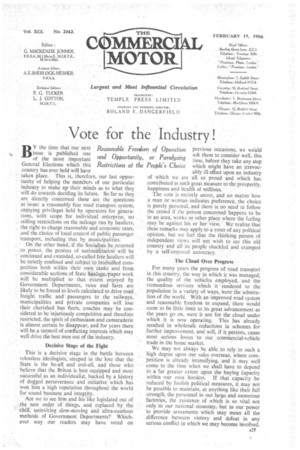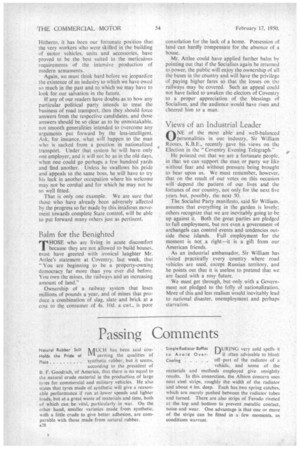Vote for the Industry !
Page 29

Page 30

If you've noticed an error in this article please click here to report it so we can fix it.
• Y the time that Our next B issue is published one of the most important General Elections which this country has ever held will have • taken place. This is,T therefore, our last opportunity of helping the members of our particular industry to make up their minds as to what they will do towards deciding its future. So far as they are directly concerned these are the questions at issue: a--reasonablyfree road transport system, enjoying privilege held by operators for generations, with' scope Toe individual enterprise, no stifling restrictions on the mileage run by hauliers, the right to charge reasonable and economic rates, and the choice of local control of public passenger -transport, including that by municipalities.
On the other hand, if the Socialists be returned to power, the process of nationalization will be continued and extended, so-called free hauliers wilt.
• be strictly confined and subject to intensified competition both within their own ranks and from • considerable sections of State haulage, paper work will be multiplied to that extent enjoyed by Government Departments, rates •and fares are likely to be forced to levels calculated to drive road. freight traffic and passengers to the railways, municipalities and private companies will lose their cherished bus fleets, coaches may be considered to be injuriously competitive and therefore restricted, the spirit of enthusiasm and camaraderie is almost certain to disappear, and for years there will be a turmoil of conflicting interests which may well drive the best men out of the industry.
Decisive Stage of the Fight This is a decisive stage in the battle between relentless ideologists, steeped in the lore that the State is the be-all• and end-all, and those who believe that the Briton is best equipped and most successful as an individualist, backed by a history of dogged perseverance and initiative which has . won him a high reputation throughout the world for sound business and integrity.
Are we to see him and his like legislated out of the new order of things, and replaced by the • 'chill, uninviting slow-moving and ultra-cautious methods of Government Departments? Whichever way our readers may have voted on Reasonable Freedom of Operation Previous occasions, we woUld ask them to consider well, this and Opportunity, or Paralysing time, before they take any step Restrictions the People's Choice which might have an irrevoc at
ably ill effect upon an industry of which we are all so proud and which has contributed in such great measure to the prosperity, happiness and health of millions.
, The vote is entirely secret, and no matter how a man or woman indicates preference, the choice is purely personal, and there is no need to follow the crowd if the person concerned happens to be in an area works or other place where the feeling may be against his or her view. We' realize that these remarks may apply to a yoter of any political opinion, but we feel that the thinking person of independent views will not wish to see this old country and ail• its people shackled and cramped by a self-imposed autocracy.
The Clood,Over Progress For many years the progress of road transport• in this country, the way in whichit Was managed, the quality of the vehicles employed, and the tremendous services which it 'rendered to the population in a variety Of ways, were' the admiration of the world. With an improved road system and reasonable freedom to expand, there would seem to be little limit to its great advancement as the years go on, were it not for the cloud under which it is now operating. -This has already resulted in wholesale reductions in schemes for further improvement, and will, if it persists, cause most serious losses to Our commercial-vehicle trade in the home market. • We may not always be able to rely, to such a high degree upon our sales overseas, where competition is already intensifying, and it may well come to the time when we shalt have to depend to a far greater extent upon the buying Capacity 'within -our own borders. If that capacity be reduced by foolish political measures, it may not be possible to maintain, at anything like their full strength, the personnel in our large and numerous factories, the existence of which is so vital not only to our national' economy, but to our power to provide armaments which may mean all the difference between victory and defeat in any serious conflict in which we may become involved. Hitherto, it has been our fortunate position that the very workers who were skilled in the building of motor vehicles, units and accessories, have proved to be the best suited to the meticulous requirements of the intensive production of modern armaments.
• Again, we must think hard before we jeopardize the existence of an industry to which we have owed so much in the past and to which we may have to look for our salvation in the future.
If any of our readers have doubts as to how any particular political party intends to treat the business of road transport, then they should force answers from the respective candidates, and those answers should be so clear as to be unmistakable, not smooth generalities intended to overcome any arguments put forward by the less-intelligent. Ask, for instance, what will happen .to the man who is sacked from a position in nationalized transport. Under that system he will have, only one employer, and it will not be as in the old days. when one could go perhaps a few hundred yards and find another. Unless he swallows his pride and appeals to the same boss, he will have to try his luck in another occupation where his welcome may not be cordial and for which he may not be so well fitted.
That is only one example. We are sure that those who have already been adversely affected by the progress so far made by this insidious movement towards complete State control, will be able to put forward many others just as pertinent.
Balm for the Benighted
THOSE who are livingin acute discomfort because they are not allowed to build houses, must have greeted with ironical laughter Mr. Attlee's statement at Coventry, last week, that "You are beginnin,g to be a property-owning democracy far more than you ever did before. You own the mines, the railways and an increasing amount of land."
Ownership of a railway system that loses millions of pounds a year, and of mines that produce a combination of slag, slate and brick at a cost to the consumer of 4s. UM. a cwt., is poor consolation for the lack of a home. Possession of land can hardly compensate for the absence of a house.
Mr. Attlee could have applied further balm by pointing out that if the Socialists again be returned to power, the public will enjoy the ownership of all the buses in the country and will have the privilege of paying higher fares so that the losses on the railways may be covered. Such an appeal could not have failed to awaken the electors of Coventry to a proper appreciation of the blessings of Socialism, and the audience would have risen and cheered him to a man.
Views of an Industrial Leader
ONE of the most able and well-balanced personalities in our industry, Sir William Rbotes, K.B.E., recently gave his views on the Election in the "Coventry Evening Telegraph."
He pointed out that we are a fortunate people, in that we can support the man or party we like without fear and without pressure being brought to bear upon us. We must remember, however, that on the result of our votes on this occasion will depend the pattern of our lives and the fortunes of our country, not only for the next five years but, possibly, the next 50.
The Socialist Party manifesto, said Sir William, assumes that everything in the garden is lovely; others recognize that we are inevitably going to be up against it. Both the great parties are pledged to full employment, but not even a government of archangels can control events and tendencies outside these islands. Full employment for the moment is not a right—it is a gift from our American friends.
As an industrial ambassador, Sir William has visited practically every country where road vehicles are used, except Russian territOry, and he points out that it is useless to pretend that we are faced with a rosy future.
We must get through, but only with a Government not pledged to the folly of nationalization. More of this and less realism would inevitably lead to national disaster, unemployment and perhaps starvation.




























































































